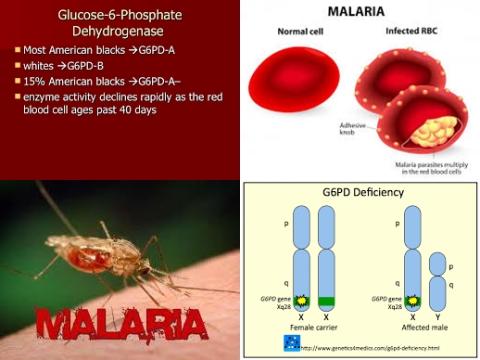
Objectives:
Although circumstantial evidence accumulated to support the hypothesis that Glucose-6-Phosphate Dehydrogenase (G6PD) deficiency is protective against severe fatal malaria; there have been several arguments for and against. Therefore, this meta-analysis (review article) has been conducted.
Is there an association between G6PD deficiency and uncomplicated P. falciparum malaria and malaria negative individuals?
Study design:
This review article included 28 studies. All included studies used prospective method for data collection; 7 studies were case-control studies, 1 was randomized double-blinded clinical trial while the rest were cross-sectional studies.
16 studies were performed on children and infants only, while the other studies included children and adults. Only 3 studies used random sampling, the other adopted consecutive method for patient recruitment.
There was publication bias in favor of studies with negative association. When the cut and fill method as proposed by Duval et al. was applied, the condition negative association was further lost [OR = 0.88, 95% CI = 0.66-1.17, p = 0.435].
There was significant heterogeneity among the studies; thus, random effect model was applied for the meta-analysis.
Results and conclusions:
The investigators found that the combined OR revealed absence of negative association between G6PD deficiency and uncomplicated malaria [OR = 0.77, 95% CI = 0.59-1.02, p = 0.07].
The investigators found, however, a negative association in Africa [OR = 0.59, 95% CI = 0.40-0.86, p = 0.007] and in the heterozygotes [OR = 0.70, 95% CI = 0.57-0.87, p = 0.001] but not in Asia [OR = 1.24, 95% CI = 0.96-1.61, p = 0.10] and in the homo/hemizygous [OR = 0.70, 95% CI = 0.46-1.07, p = 0.10].
The investigators found no association between G6PD deficiency and total severe malaria [OR = 0.82, 95% CI = 0.61-1.11, p = 0.20]. Similarly, there was no association with other malaria species.
The investigators concluded that Glucose-6-Phosphate Dehydrogenase (G6PD) deficiency reduces uncomplicated falciparum malaria risk in African countries, but not severe malaria. Interestingly, this protection was mainly in heterozygous, being x-linked thus related to gender.
Original title:
Association of glucose-6-phosphate dehydrogenase deficiency and malaria: a systematic review and meta-analysis by Mbanefo EC, Ahmed AM, […], Hirayama K.
Link:
https://www.ncbi.nlm.nih.gov/pmc/articles/PMC5382680/
Additional information of El Mondo:
Find more information/studies on food fortification/malnutrition right here.
Glucose-6-Phosphate Dehydrogenase (G6PD) deficiency is a condition in which red blood cells break down when the body is exposed to certain drugs or the stress of infection. Glucose-6-Phosphate Dehydrogenase deficiency is a genetic disorder that occurs almost exclusively in males.
The most common medical problem associated with Glucose-6-Phosphate Dehydrogenase deficiency is hemolytic anemia, which occurs when red blood cells are destroyed faster than the body can replace them.